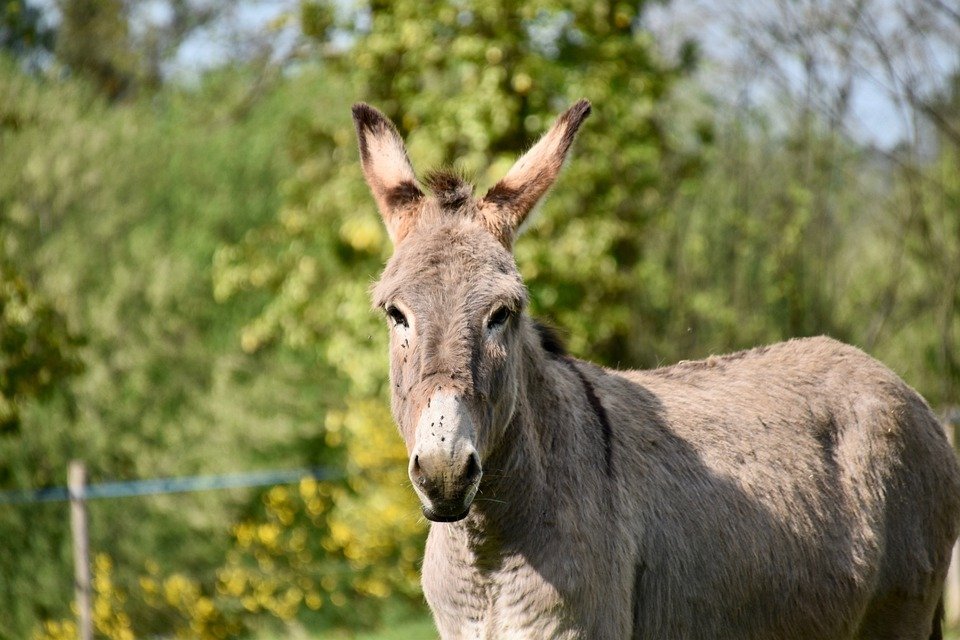Read in : தமிழ்
Donkeys have been associated with human beings for ages. While horses were regal and associated with the rulers, donkeys were the common man’s means of transport. Donkeys have been with us carrying heavy loads meekly. Biblical references are plenty on donkeys. Jesus rode a colt to enter Jerusalem.
There is a Tamil saying, “Azhutha pillai siruchucham, kazhutha paala kuduchucham” (weeping baby drank donkey milk and laughed). Does this proverb have any scientific meaning? We remember the old days when donkeys (jennies) were taken around and milk was instantly extracted and sold to consumers.
Donkey milk has gained commercial importance now and people have started rearing donkeys for its milk, not as a beast of burden. Donkey farms have started emerging and donkey milk is freshly collected, pasteurized, bottled and sold. We can get donkey milk powder through Amazon.
The cost of donkey milk is some Rs.150/10mL in rural Tamil Nadu and ranges between Rs 2000/L to Rs 7000/L in other parts of India and €43 /L (Rs.3614/-) in European Union. It would seem the donkey’s milk is worth its weight in gold now. Not too long back, however, the local washerman would give it free if there was a newborn. It was considered an elixir for malnourished babies.
Donkey farms have started emerging and donkey milk is freshly collected, pasteurized, bottled and sold. We can get donkey milk powder through Amazon.
The more scientists research on a product, the costlier the product becomes. Scientists started analysing the qualities of donkey milk as it was also used as an alternative to breast milk and cow’s milk for babies.
Some newborn babies do not have tolerance to milk sugar and the condition is termed as Lactose Intolerance. There is also another case where children cannot tolerate the protein in milk and that condition is termed “Cow’s Milk Protein Allergy” (CMPA).
The protein present in milk is known as Casein which has different fractions, namely alpha s1, alpha s2, beta casein and kappa casein. Researchers have identified that this casein is less in donkey milk (0.7g/100mL) when compared to cow milk (3.25g/100mL). It is an interesting fact that children with CMPA can consume donkey milk and do not exhibit any allergy symptoms. The protein contribution of donkey milk is from its whey protein.
This combination and composition of protein and lactose makes donkey milk an alternative to breast milk as it is a composition in infant formulas too. Moreover, donkey milk escapes digestion and enters the intestinal track where it is metabolized by the gut microflora, becoming probiotic food. The fat content of donkey milk is very less making it ideal for the obese and elderly. Donkey milk also contains other minerals and vitamins. Vitamin C content in donkey milk is found to be equal to breast milk and higher than cow milk.
In addition to its nutritional properties, donkey milk also possesses antimicrobial properties, immune stimulating properties and anti-inflammatory properties. The presence of high content of lysozyme in donkey milk protects infants from intestinal problems caused by bacteria. Donkey milk has good palatability which is because of the high lactose content that makes children consume it willingly.
Scientists started analysing the qualities of donkey milk as it was also used as an alternative to breast milk and cow’s milk for babies
.
In addition to nutritional properties and associated demand, donkey milk has high demand among women as it is used in cosmetic product formulations. The lead for this idea is from ancient beauty queen Cleopatra who apparently used donkey milk for shiny skin. Why is milk a beauty product? Milk naturally acts as cleanser, toner, moisturizer, exfoliate and keeps the skin young and fresh.
The high content of lactose in donkey milk yields high amount of lactic acid. Hence it naturally helps to shed dead cells and rejuvenate the skin. If fresh donkey milk is not available nearby, one can consider buying donkey milk-based soap, cream, face mask, face wash, and moisturizing cream which are available online.
Investing in donkey rearing can be a good business. The cost of one donkey ranges from INR 80,000 to 1,00,000 which means it is not advisable to address an irresponsible guy donkey anymore.
Read in : தமிழ்











